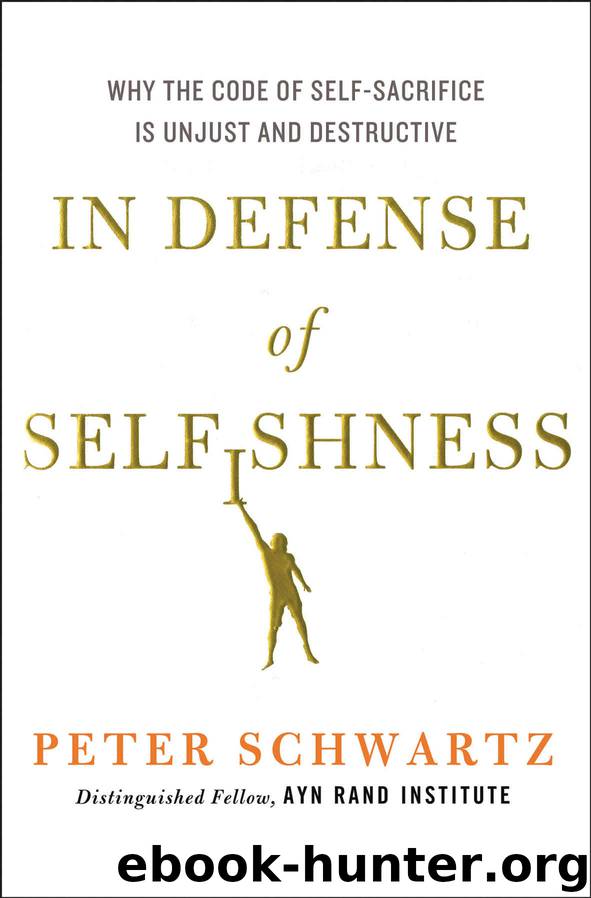In Defense of Selfishness: Why the Code of Self-Sacrifice is Unjust and Destructive by Peter Schwartz

Author:Peter Schwartz
Language: eng
Format: mobi
Publisher: St. Martin's Press
Published: 2015-06-01T14:00:00+00:00
SIX
THE COLLECTIVIST STRAITJACKET
In defining the central purpose of government—as we’ve seen in defining a system of ethics—there are two antithetical approaches, deriving from one’s fundamental view of man. The individualist approach, which regards man as a rational, productive being, asks: “What political system will allow him to take the actions necessary to sustain his life?” The collectivist approach, which regards man as an ineffectual, perpetually needy entity, asks: “What political system will allow him to be taken care of by society?” The first approach results in a system of self-interest and individual freedom, as envisioned by America’s Founding Fathers; the second leads to a system of self-sacrifice and collective control, as exemplified by the modern welfare (or “entitlement”) state.
The welfare state is the system now adopted by America, and most of the Western world. In it, government is seen as indispensable in providing its citizenry with the means of coping with the demands of living. According to the tenets of altruism, people are morally entitled to have their unfulfilled needs met; the welfare state ensures that they are politically entitled as well. Food, housing, education, medical care—if people lack it, the government supplies it.
In 1944, Franklin Roosevelt proposed the radical idea of a “Second Bill of Rights,” under which everyone would be guaranteed by law “a useful and remunerative job . . . adequate food and clothing and recreation . . . a decent home . . . adequate medical care . . . protection from the economic fears of old age, sickness, accident and unemployment . . . [and] a good education.”1 Today, that proposal is hardly controversial. “There are certain economic rights . . . to the basic necessities of life”—the American Civil Liberties Union asserts—under which, for instance, “a homeless person has a right based in the Constitution to have shelter.”2
This view, of course, is simply a secular version of the Biblical injunction to sacrifice for the needy. “As followers of Jesus Christ and participants in a powerful economy,” the National Conference of Catholic Bishops explains, “Catholics in the United States are called to work for greater economic justice.” How? By implementing the principle that “people have a right . . . to secure the basic necessities of life, such as food, clothing, shelter, education, health care, safe environment and economic security.”3
So the government distributes the food, the clothing, the shelter, the health care—but only by first expropriating the funds from the producers of wealth. The premise behind “economic rights” is that some people have the right to demand that the government compel others to sacrifice for them.
TO BE TAKEN CARE OF IS TO BE CONTROLLED
But if people have to be taken care of by the state, if they cannot be left on their own, then they cannot be trusted to make decisions by themselves. If they are to be fed, they must be told what food is to be permitted them. This is why, for example, we are given state-approved nutritional requirements by the Department of
Download
This site does not store any files on its server. We only index and link to content provided by other sites. Please contact the content providers to delete copyright contents if any and email us, we'll remove relevant links or contents immediately.
| Anthropology | Archaeology |
| Philosophy | Politics & Government |
| Social Sciences | Sociology |
| Women's Studies |
The Secret History by Donna Tartt(19053)
The Social Justice Warrior Handbook by Lisa De Pasquale(12187)
Thirteen Reasons Why by Jay Asher(8893)
This Is How You Lose Her by Junot Diaz(6877)
Weapons of Math Destruction by Cathy O'Neil(6265)
Zero to One by Peter Thiel(5786)
Beartown by Fredrik Backman(5737)
The Myth of the Strong Leader by Archie Brown(5500)
The Fire Next Time by James Baldwin(5431)
How Democracies Die by Steven Levitsky & Daniel Ziblatt(5215)
Promise Me, Dad by Joe Biden(5141)
Stone's Rules by Roger Stone(5081)
A Higher Loyalty: Truth, Lies, and Leadership by James Comey(4954)
100 Deadly Skills by Clint Emerson(4921)
Rise and Kill First by Ronen Bergman(4779)
Secrecy World by Jake Bernstein(4741)
The David Icke Guide to the Global Conspiracy (and how to end it) by David Icke(4708)
The Farm by Tom Rob Smith(4502)
The Doomsday Machine by Daniel Ellsberg(4484)
